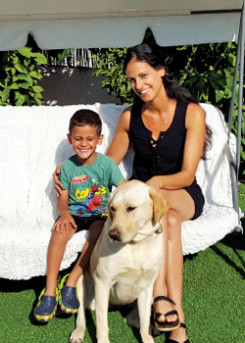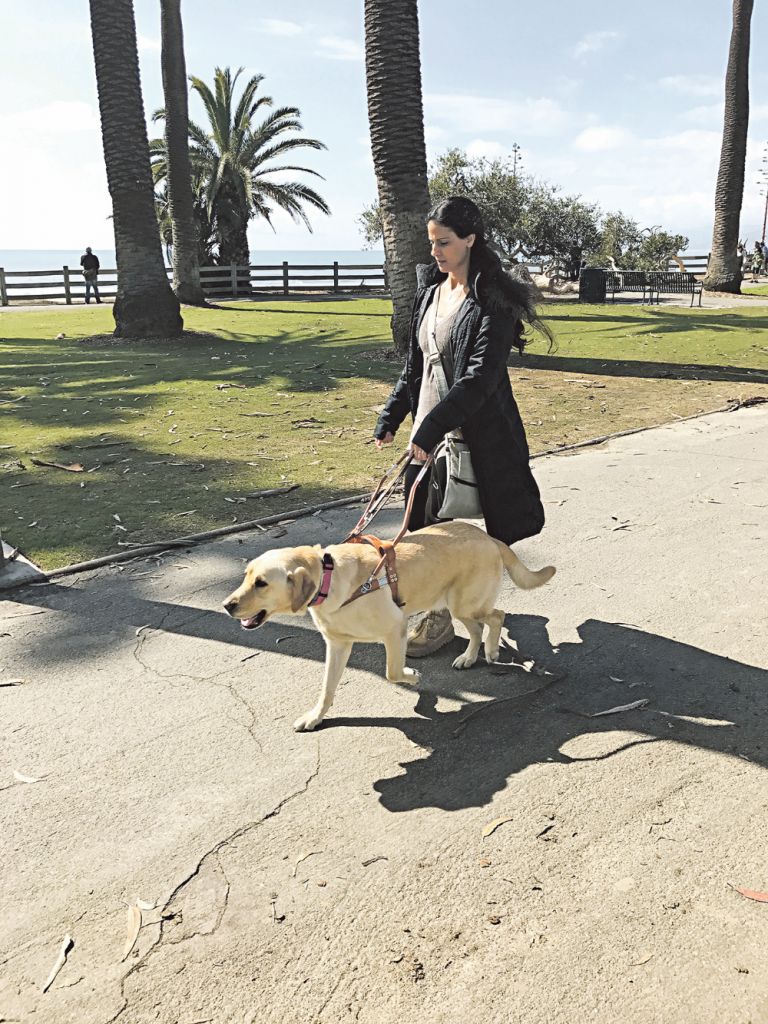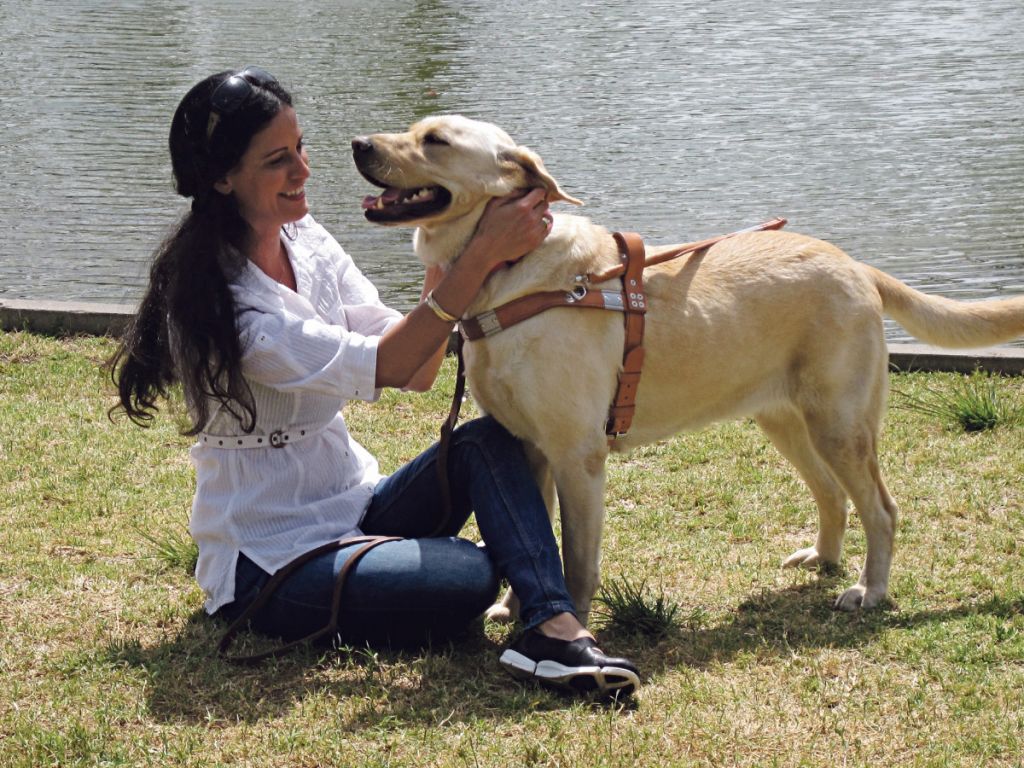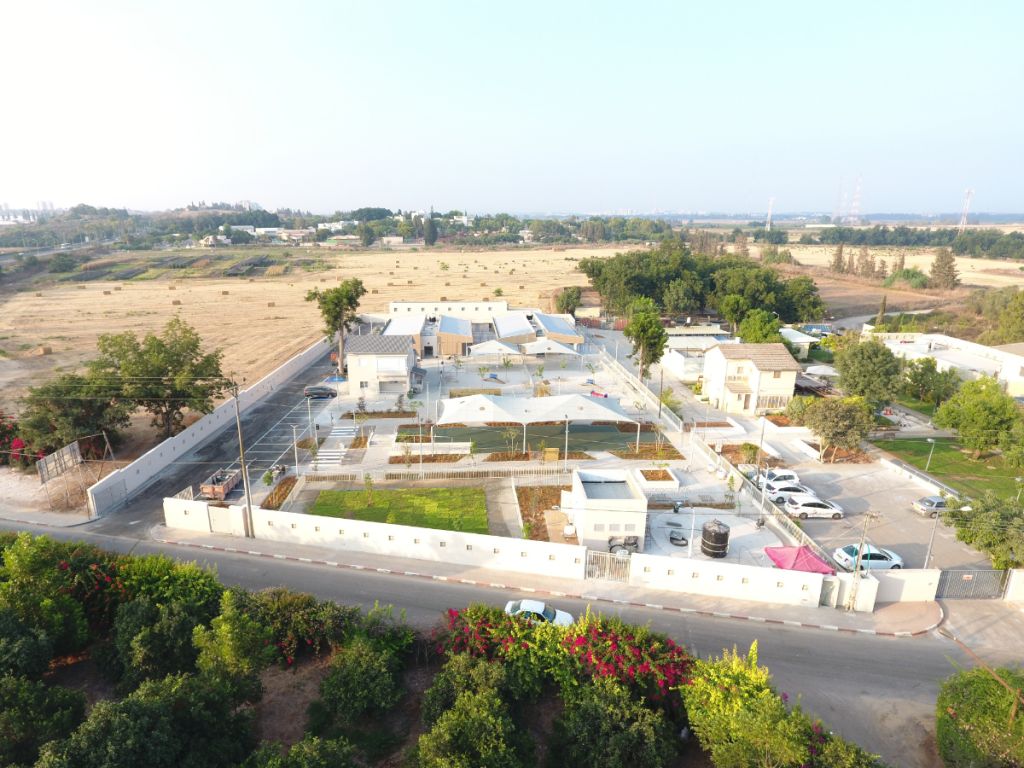Israel Guide Dogs: A way to take the lead
Blindness brought Ruth and Uri together as friends. The Israel Guide Dog Centre gave them freedom....
Like every expectant mother, Ruth Nachshon pictured what life would be like once she had her baby. She thought about the things they would do together and all the places they would see. The future could not have been brighter, but darkness descended quite literally on the day her son Uriya was born. During labour, Ruth went suddenly, completely, and permanently blind.
The possibility that it might happen had always been there. Retinitis pigmentosa, a hereditary condition had caused her mother, aunt, and sister to go blind, and this terrifying history cast an ominous shadow over Ruth’s prenatal happiness. “It felt like a bomb had gone off,” says Ruth as she recalls the first moments of Uriya’s life and the rollercoaster of emotions as joy and elation were swept away by the deepest sorrow.
Ruth knew immediately that she would never see the adorable face of the baby boy she had waited nine months to admire. She would never see his eyes, his tiny hands, or be moved by his first smile.
Get The Jewish News Daily Edition by email and never miss our top stories Free Sign Up
That she could ever come to terms with such a cruelly timed loss of sight was unimaginable. “There was no time to absorb the impact the loss of vision would have on my life and the complications it had brought to my family, my husband and our relationship. But I had to decide quickly on how to proceed and I chose
to continue living.”

Ruth also realised that she needed to care for Uriya and she wanted to be the best possible mother because she was haunted by the memories of leading her own mother with her long white cane down a village road.
“It felt shameful to me,” she recalled. “I despised the pitying looks she received from people.”
Ruth swore, as a young girl, that she would be a different mother – one who would do things for her child but, tragically, she was now faced with identical challenges.
Looking after her baby, while her husband, a career soldier in the IDF, worked long hours was tough and she relied on family and friends – or the humiliating white cane – to tap tap her way for errands and take her son to preschool.
But then she met Uri Basha, a former clinical social worker turned goat farmer and they connected immediately. Uri had been blinded by shell fragments in Israel’s first Lebanon war, but immediately refused to give up his independence and requested a guide dog. With no guide dog training school available in the 1980s in Israel, Uri had to wait until the Israel Guide Dog Centre for the Blind opened in 1991 to get his first dog Polly, but he didn’t waste the time.

At a rehab facility for injured soldiers, he discovered the joys of horseback riding and began training in competitive riding and was sixth overall in England’s World Paralympics Championships. He also gained a Bachelor’s degree in clinical social work from Tel Aviv University and a Masters in treating addictions and, for several years, counselled private patients and groups.
By the time he met Ruth, Uri was tending goats on the farm he shares with his wife, Rachel, their four children, house pets, chickens, and horses. His life was instant inspiration for the young woman who feared she was taking two steps forwards and one step back with her cane and couldn’t believe she would be able to do anything by herself.
Encouraged by Uri, Ruth joined the CanVelo Tandem Bike Riding Group and met others who were blind and had learned to cope with their vision loss. Together, they supported her and helped her deal with a new reality, and because Uri had a guide dog, Ruth began thinking in this direction. “I knew it would be a huge step forward and allow me to have independence and mobility,” she says. “A dog would also give me the ability to be the mother that I wanted to be.”
The process of getting a guide dog takes time and Ruth realised that eligibility depended on her becoming proficient in basic mobility and cane use. Luckily, Ruth had always been an achiever and holds degrees in human resources, marketing and sales, but when blindness robbed her of her career, she did reflexology at home, while training to become an accomplished dancer, ceramicist and sculptures. If she could do all this and bike and hike, she could acquire the necessary orientation skills to get a dog.

For many years, Uri’s guide dog, Polly, had been his devoted companion and guide. But when she needed to retire, Uri wanted his new dog to be a German Shepherd. As most of the centre’s dogs are Labradors, Golden Retrievers and a first-cross Golden-Lab mix, they turned to their partner organisation in the US – Guiding Eyes for the Blind, and in a “paws-across-the-sea” partnership provided a German Shepherd, bred and nurtured him, and brought him to Israel where he was trained in Hebrew using state-of-the-art methods specially adapted for the challenging conditions.
Triton is practically a native now and Uri couldn’t imagine life without him. “Getting a dog was like taking a prisoner and releasing him from his handcuffs,” says Uri on reflection, and this was how Ruth felt when she was finally
partnered with her dog, Roxie.
“It was like getting a piece of 24 carat gold “ says the delighted mother. “With Roxie, I can go forward with my life. It’s as if another child was born and if Uria is afraid, he calls for Roxie and when my husband does sport, he takes her along.”
For all the family bonding, it is Ruth who needs Roxie most of all and the dog’s presence has helped soften the issue of blindness.
“When I am walking with her, I forget that I am blind,” whispers Ruth. “When I lost my sight, I couldn’t imagine taking a train, going on a bus, or ever being by myself. Roxie has changed that, and because of her, there are no obstacles and I don’t have the feeling of loneliness. She is also like a magnet. When I am out with her, people come over to chat as they all want to meet her. But now at last they also see me.”
A space for the future
The builder’s dust has yet to settle at the Israel Guide Dog Centre, but the year ends with a drum roll as the new Puppy Development and Training Campus will be open for business at the start of 2018.
Training dogs and raising puppies to the sound of cement mixers wasn’t easy, but increasing the space was critical to significantly expand the number of guide dog partnerships
in Israel.
The new campus will open a new chapter in the history of the Israel Guide Dog Centre and allow the charity to reach out to more clients, have a stronger impact on the lives of the blind and visually-impaired in Israel, and enable them to live independent and mobile lives.
Construction on the 1.5 acre campus began last December and, although they are still building the new kennels and whelping facilities, once complete, they will double the capacity and have enrichment and training yards. A logistic support centre is also under construction for the CanVelo Bike Group, maintenance workshop and storage facilities.

The expansive campus includes training grounds to help the dogs better learn the tasks they require and to allow students to master the skills they need to work with their guide dogs.
Of course, final completion is only possible with more funds and raising them isn’t easy, but we hope that the Festival of Light will provide the necessary miracles to enable us to provide more dogs to people
who want to live again.
The construction might almost be finished, but once the campus is open, then there is a ‘bedding-in’ period, where systems and services need to be tried and tested and any issues rectified. It might not sound glamourous, but our facilities team, led by Mensahe Kashi, the centre’s operations director, will work long hours every day to get all this completed by the time of the official grand opening at the beginning of next April. Then there is all the equipment, fixtures and fittings that need to be purchased to put the finishing touches to this amazing new campus.
Just by way of encouragement, we wanted to tell you that since Rosh Hashanah 2016, our whelping dogs have given birth to 113 puppies! We would like to congratulate all our mothers, so it’s mazeltov to: Yogi, Carolyn, Valerie, Lika, Valley, Andy, Amy, Chika, Lika, Amber, Nera, Moka, Luli, Topsie, Hope.

Thank you for helping to make Jewish News the leading source of news and opinion for the UK Jewish community. Today we're asking for your invaluable help to continue putting our community first in everything we do.
For as little as £5 a month you can help sustain the vital work we do in celebrating and standing up for Jewish life in Britain.
Jewish News holds our community together and keeps us connected. Like a synagogue, it’s where people turn to feel part of something bigger. It also proudly shows the rest of Britain the vibrancy and rich culture of modern Jewish life.
You can make a quick and easy one-off or monthly contribution of £5, £10, £20 or any other sum you’re comfortable with.
100% of your donation will help us continue celebrating our community, in all its dynamic diversity...
Engaging
Being a community platform means so much more than producing a newspaper and website. One of our proudest roles is media partnering with our invaluable charities to amplify the outstanding work they do to help us all.
Celebrating
There’s no shortage of oys in the world but Jewish News takes every opportunity to celebrate the joys too, through projects like Night of Heroes, 40 Under 40 and other compelling countdowns that make the community kvell with pride.
Pioneering
In the first collaboration between media outlets from different faiths, Jewish News worked with British Muslim TV and Church Times to produce a list of young activists leading the way on interfaith understanding.
Campaigning
Royal Mail issued a stamp honouring Holocaust hero Sir Nicholas Winton after a Jewish News campaign attracted more than 100,000 backers. Jewish Newsalso produces special editions of the paper highlighting pressing issues including mental health and Holocaust remembrance.
Easy access
In an age when news is readily accessible, Jewish News provides high-quality content free online and offline, removing any financial barriers to connecting people.
Voice of our community to wider society
The Jewish News team regularly appears on TV, radio and on the pages of the national press to comment on stories about the Jewish community. Easy access to the paper on the streets of London also means Jewish News provides an invaluable window into the community for the country at large.
We hope you agree all this is worth preserving.
-
By Brigit Grant
-
By Laurent Vaughan - Senior Associate (Bishop & Sewell Solicitors)
-
By Laurent Vaughan - Senior Associate (Bishop & Sewell Solicitors)
-
By Laurent Vaughan - Senior Associate (Bishop & Sewell Solicitors)
-
By Laurent Vaughan - Senior Associate (Bishop & Sewell Solicitors)





















